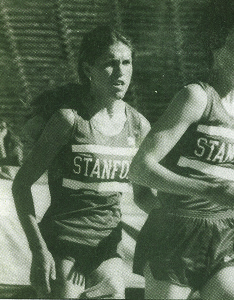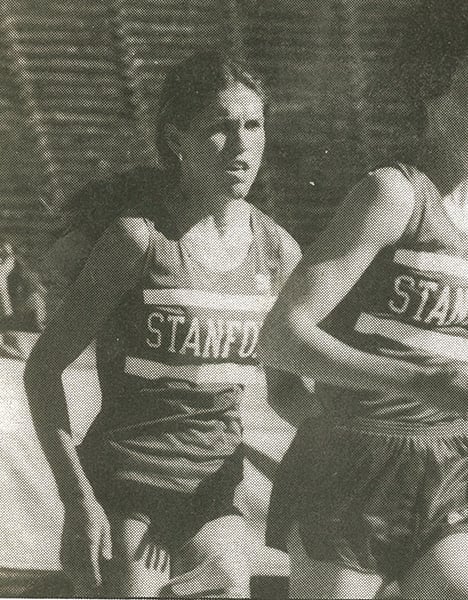PattiSue Plumer ‘85 J.D. ‘89 isn’t just the associate cross country coach and assistant track and field coach; she’s one of the most accomplished long-distance runners in Stanford history.

A Stanford Hall of Fame member, nine-time All-American, two-time NCAA track and field champion, former record-holder in the 5,000 meters and two-time Olympian, Plumer holds a wide range of experiences from collegiate meets to elite international competitions.
Her experience is more relevant than ever this year as 37 Stanford-affiliated athletes—including five current student-athletes—representing eight countries head to London to participate in the Games of the XXX Olympiad.
Much like other Olympic-level athletes, Plumer is no stranger to hardship. Throughout her professional career, she experienced injuries and setbacks, such as a broken leg after being hit by a taxi, several bouts with pneumonia, food poisoning at the Seoul Olympics, pregnancy and a dog bite at the 1991 World Championships.
Yet she believes that her challenges began far before she went pro—and that her experience at Stanford was key to her success.
“Having to manage being a student and an athlete was a challenge for sure. Especially as a Stanford student on the quarter system, all of the track and field NCAAs were always around finals,” Plumer said. “It just wears on you as a college student; there are the challenges of sleeping and eating right. When you’re a pro athlete, you have to deal with jetlag and living in hotels…but being a Stanford student prepares you for that pretty well, because they give you a skill set that you can carry on to your life as a professional athlete.”
Despite the prestige of competing in the Olympics, Plumer believes that her stressful experiences competing regularly at the collegiate level as a Stanford student-athlete helped her succeed on the elite circuit.
“My dream when I was six years old was to make the Olympic team,” Plumer said. “But if I had to choose, I couldn’t not have taken up the Stanford team and winning two NCAA titles. I competed regularly throughout all four years, so I obviously thought it was pretty demanding, regardless of the fact that it wasn’t as demanding as the Olympics. As an 18- to 19-year-old, it was pretty much all I could handle. It prepared me well for my post-collegiate athletic experience.”
Although the challenges of being a college athlete were somewhat different from those of a professional athlete, Plumer learned to use the fundamental skill sets she had built up as a Stanford student.
“When you’re a professional athlete, you travel all over the world and the competition is much greater and the challenges as an athlete are greater,” she said. “There are some real changes.
“For example, as a distance runner at Stanford, there’s so many big meets and you really don’t have an extended period of training,” Plumer added. “So it’s really difficult as an athlete at Stanford to balance that, but you don’t have to think about what you have to run. When you go pro, you really have to think about what races you have to run and make good choices. But I think you’re prepared to compete and Stanford prepares you well to compete at this [professional] level.”
Although Plumer will not be in London this summer in order to prepare for the upcoming cross country season, she will be watching the Games to keep her eye on two current student-athletes.
“I’m definitely looking forward to the athletes that are currently on our team like Amaechi Morton, who I think has a great chance of making the finals. He’s a great competitor and a lot of fun to watch,” Plumer said. “Also Katerina Stefanidi, who’s competing for Greece, I think has a great chance of making the finals in the pole vault. I’m a little jealous of them, but it’s just so exciting. Because they love track in Europe, having it there is going to be such a great, great experience.”
